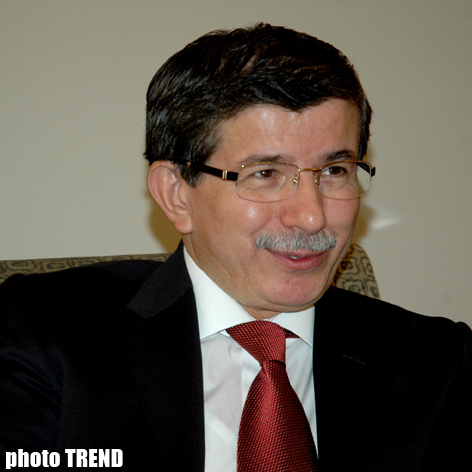Turkish Foreign Minister Ahmet Davutoglu has commented on negotiations over the Lebanese government crisis, which he held in Beirut, Today's Zaman reported.
"Compared to yesterday [Tuesday], there are positive developments. At least none of the parties have categorically rejected our efforts. That is why we found the chance to go into the details of the process. This is important," Davutoglu told reporters following his meetings. "If any of the parties had insisted on maintaining their position, which is what happened on Sunday, then making progress would have been difficult," he said.
The Turkish minister praised efforts by Saudi Arabia and Syria, which failed to forge a deal to curb political tensions in Lebanon, while underlining that Qatar and Turkey have been "in supportive efforts" to those already exerted by Saudi Arabia and Syria.
"This is not an alternative or parallel initiative. We hope that if progress is made, Saudi Arabia will play the constructive role that it has always played," Davutoglu said, reminding that Saudi Arabia on Wednesday announced it had abandoned efforts to mediate in Lebanon's political crisis. Davutoglu also noted that Turkey and Qatar have been "informing" Saudi Arabia of their efforts, in addition to "consulting."
Davutoglu, meanwhile, reiterated that a solution should come from within the region and urged regional actors to support the progress made by Lebanese actors within the country.
"An international meeting will be meaningful only after such regional support is provided. Holding an international meeting without building the necessary infrastructure will not yield the desired outcome," Davutoglu said, adding that following the establishment of internal grounds in Lebanon, as well as regional grounds, contact with UN Security Council members should also be maintained.
A visit to Turkey by Russian Foreign Minister Sergei Lavrov, whose country is a key permanent member of the UN Security Council, which was scheduled to kick off later on Wednesday, will provide an opportunity for talks on the Lebanon issue, Davutoglu said.
Davutoglu, a "cautious optimist" in finding a solution to the crisis in Lebanon, met with Hezbollah leader Sayyed Hassan Nasrallah Tuesday night as part of joint efforts by Turkey and Qatar to solve the crisis in Lebanon.
The meeting took place in a secret venue near Beirut, as Nasrallah's life is under threat by many powers, including Israel. The meeting with Nasrallah followed the nearly four-hour-long talks with caretaker Prime Minister Saad Hariri earlier on Tuesday evening.
Davutoglu and his Qatari counterpart, Sheikh Hamad bin Jassim al-Thani, arrived in Beirut on Tuesday afternoon a few hours after Hezbollah forces took to the streets briefly, flexing its muscles in protest of the indictment of the Special Tribunal for Lebanon (STL), which was established under the UN Security Council auspices to investigate the 2005 assassination of former Prime Minister Rafik Hariri. It is expected that the indictment will accuse some Hezbollah members of assassination.
Saad Hariri's government collapsed last Wednesday when Hezbollah and its allies withdrew, anticipating being indicted for the 2005 assassination.
During the meeting with Nasrallah, which lasted almost three hours, the Qatari and Turkish ministers underlined that stability in Lebanon will have positive repercussions for peace in the region, a Turkish Foreign Ministry source said, adding, "We also underlined that the process should continue in a peaceful manner."
Another subject stressed by the visiting ministers was the prevention of the spirit of national unity. The same source added that they exchanged views on the STL but did not elaborate on the subject.
On the ground in Beirut, most of the politicians indicate the lack of a spirit of national unity. Hariri's block underlined that the STL is a red line and that Hariri is stuck in his stance.
Davutoglu and al-Thani held talks with President Michel Suleiman and Parliament Speaker Nabih Berri on Tuesday, yet there were no statements after these meetings. However, according to Lebanese newspaper An-Nahar, Berri said he has informed the visiting ministers that the majority March 14 coalition (Hariri's block) "missed a golden opportunity -- a guarantee out of this crisis."
While speaking with a small group of journalists on board a plane to Beirut on Tuesday, Davutoglu said that a solution that takes the realities of both sides into account should be supported and no group should be excluded from the process.
However, a powerful figure in Hariri's block, Antonie Zahra from the Lebanese Forces party, said the March 8 coalition (Hezbollah-led opposition) should refrain from participating in the upcoming government if Hariri gains a parliamentary majority and is again nominated as prime minister.
While speaking to Turkish journalists prior to his meetings, Davutoglu said that since Hariri's block gets most of the votes, a government established by him would be healthier, in principle. But if there is consensus on another candidate for prime minister within the block, that is up to them to decide, he added.
The two leaders were expected to meet with Druze leader Walid Jumblatt on Wednesday, whose block's decision for the next prime minister will be very important due to the composition of parliament.






